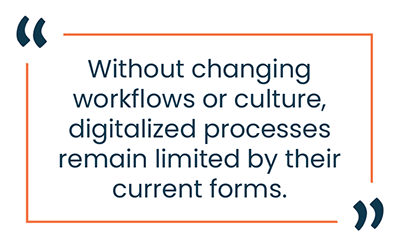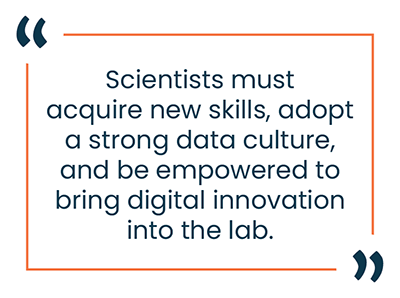
“Digital transformation”, “machine learning”, and “artificial intelligence” are buzzwords heard in every industry, from the boardroom to the lab.
We asked Dr. Michael Heiber, lead of Enthought’s Materials Informatics solutions, about what these technology trends mean for the future of materials and chemical labs and product development.
Q: What are some of the top challenges of chemical and materials-based companies?
Michael Heiber: Industry success today is largely dictated by the ability to continuously develop and leverage innovative new materials and chemicals. Historically high-margin specialty products are becoming more commoditized, and the race is on for companies to differentiate themselves in existing markets and establish a leading presence in new emerging markets. Some are looking to traditional IT solutions and AI platforms to gain competitive advantage but are learning that these tools just aren’t effective for their R&D labs.
Science is different. Science data is different. Product development teams are often working with orders of magnitude more tunable variables and orders of magnitude less data that is sparse, non-uniformly distributed, and messy. You can’t just install an off-the-shelf product as a one-and-done solution. The most effective tools are those that are flexible enough to integrate into the existing complex R&D workflows that are driven by the researchers and continuously evolve as needs change. Science is iterative and boundless and so should be your scientific software tools.
Q: R&D organizations of most large specialty chemical companies have started investing in machine learning, AI, and robotic automation. Why do you think many have yet to fully leverage these tools?
MH: Companies are rightly looking to technology to drive decision-making and as a solution to help get products to market faster, but adoption and integration of these digital capabilities into the business can be ill-defined. We often see companies exploring these avenues in corporate R&D teams that are very disconnected from the business. While these methodologies are always advancing, they are mature enough to make a big impact on business today.  To fully leverage Materials Informatics, the marriage of materials science and data science, companies need to directly connect technology and technical success to business outcomes, get buy-in from both business leaders and R&D groups, and build up the digital skills of its researchers to accelerate traditional R&D. Without changing workflows or culture, digitalized processes remain limited by their current forms. We’ve seen great success when the investment in Materials Informatics is done right.
To fully leverage Materials Informatics, the marriage of materials science and data science, companies need to directly connect technology and technical success to business outcomes, get buy-in from both business leaders and R&D groups, and build up the digital skills of its researchers to accelerate traditional R&D. Without changing workflows or culture, digitalized processes remain limited by their current forms. We’ve seen great success when the investment in Materials Informatics is done right.
For example, Enthought works closely with a lab that develops polymer thin films for electronics applications and engineered a data-driven solution to identify optimal sample fabrication conditions 100% faster with a 50% reduction in material consumption. This directly enables their application engineering team to iterate faster with and deliver a superior product to their customers. We also recently collaborated with a team at a large oil company to develop a solution that has dramatically accelerated catalyst development for carbon capture and re-use, which has allowed them to reach target materials properties far ahead of schedule. This directly ties to their business strategy of growing the specialty chemicals side of their business in new emerging markets. We developed another solution for a specialty plastics provider that resulted in a $90K savings per formulation during recipe scale-up to production and reduced their product time-to-market by months. This directly allows them to compete for more business in high-end engineering plastics markets for aerospace and automotive applications. These examples show the possibilities when teams are empowered with tailored digital solutions and critical skills for tackling their unique challenges.
Q: What is true digital transformation and what does it look like for the materials R&D lab?
MH: At Enthought, we help companies answer the question “what could be accomplished if our scientists could spend 100% of their time advancing their discoveries?” The real prize with digital transformation is in enabling scientific discovery that has an exponential positive impact on the business. With a data-centric lab, scientists can accelerate workflows and processes, allowing them to make better, faster decisions in the lab and bring new innovative products to market faster than ever before. Most routine work is systematized and automated, and researchers can shift focus to innovative and informative new data sources (new kinds of experiments and simulations) and get into a routine of continuous value-driven process improvement.
When a materials R&D lab arrives at a point where the scientists can dial-in desired product properties, samples with those properties are produced automatically, and continuous digital innovation is built into the culture, there has been a true transformation. This is best achieved, not by hiring centralized data science teams that liaise with researchers, but by digitally transforming R&D labs and teams from the ground up and creating diverse, multidisciplinary teams across the company. Digital innovation should be decentralized so that the best ideas can be created, nurtured, and realized.
Q: Many leaders acknowledge that transformational change must happen for their business to remain competitive. What is one of the first things they can do to get started?
 MH: You cannot buy an off-the-shelf product that truly strengthens your unique competitive advantage. Digital transformation in R&D does require the use of different machine learning and AI methods, but most importantly it requires a much tighter interaction between data science, software engineering, and materials expertise. Scientists must acquire new skills, adopt a strong data culture, and be empowered to bring digital innovation into the lab. To get started, find the low-hanging fruit, something with value but not too difficult, and work out a solution. Even something small will help build capability and buy-in, and when it produces value you can justify continued investment in digital projects. This should be done in a way that adds to both value and capability over time, so the competitive advantage you have in your product portfolio and R&D expertise can be extended into the digital realm as well.
MH: You cannot buy an off-the-shelf product that truly strengthens your unique competitive advantage. Digital transformation in R&D does require the use of different machine learning and AI methods, but most importantly it requires a much tighter interaction between data science, software engineering, and materials expertise. Scientists must acquire new skills, adopt a strong data culture, and be empowered to bring digital innovation into the lab. To get started, find the low-hanging fruit, something with value but not too difficult, and work out a solution. Even something small will help build capability and buy-in, and when it produces value you can justify continued investment in digital projects. This should be done in a way that adds to both value and capability over time, so the competitive advantage you have in your product portfolio and R&D expertise can be extended into the digital realm as well.
However, the people side of this transformation journey cannot be underestimated when getting started. If you are early in your journey, it might be best to choose a challenge where a team is excited to try something new and innovative over a challenge that has the greatest business priority but the team seems resistant. These early adopter teams with the right aptitude and ‘can-do’ attitude are poised to become internal digital champions and future digital leaders in the company that will be essential to broader transformation down the road.
Contact us to learn more about how Enthought can help your organization.

Michael Heiber holds a Ph.D. in polymer science from The University of Akron and a B.S. in materials science and engineering from the University of Illinois at Urbana-Champaign with expertise in polymers for optoelectronic applications. He leads Enthought's Materials Informatics solutions.
Prior to joining Enthought, Michael worked as a postdoctoral researcher at several institutions, where he developed improved physical models for organic electronic devices using custom open source software tools for physics-based device simulations, automated experimental measurements, and advanced data analysis. At Enthought, he drives diverse client projects from laboratory automation to data-driven recommendation systems to MI training.
Related Content
The Emergence of the AI Co-Scientist
The era of the AI Co-Scientist is here. How is your organization preparing?
Understanding Surrogate Models in Scientific R&D
Surrogate models are reshaping R&D by making research faster, more cost-effective, and more sustainable.
R&D Innovation in 2025
As we step into 2025, R&D organizations are bracing for another year of rapid-pace, transformative shifts.
Revolutionizing Materials R&D with “AI Supermodels”
Learn how AI Supermodels are allowing for faster, more accurate predictions with far fewer data points.
What to Look for in a Technology Partner for R&D
In today’s competitive R&D landscape, selecting the right technology partner is one of the most critical decisions your organization can make.
Digital Transformation vs. Digital Enhancement: A Starting Decision Framework for Technology Initiatives in R&D
Leveraging advanced technology like generative AI through digital transformation (not digital enhancement) is how to get the biggest returns in scientific R&D.
Digital Transformation in Practice
There is much more to digital transformation than technology, and a holistic strategy is crucial for the journey.
Utilizing LLMs Today in Industrial Materials and Chemical R&D
Leveraging large language models (LLMs) in materials science and chemical R&D isn't just a speculative venture for some AI future. There are two primary use...
Top 10 AI Concepts Every Scientific R&D Leader Should Know
R&D leaders and scientists need a working understanding of key AI concepts so they can more effectively develop future-forward data strategies and lead the charge...
Why A Data Fabric is Essential for Modern R&D
Scattered and siloed data is one of the top challenges slowing down scientific discovery and innovation today. What every R&D organization needs is a data...